|
|
|
|
Appeal team interview - September 2001
 |
Appeal - September 2001 |
 |
Franck Sauer - Artistic Director. Yann Robert - Development director.
Carlo Fabricatore - Project Manager.
The_content_team_Gil_Hassan_Chrichri_Steph (236 ko)
1. To begin, can you tell us about your respective paths. How did you get to video games?
FS : At the high school (in 1986), I met Yves Grolet and, being both fans of commodore64, we decided to create an adventure game, No. Because of our studies, that took us three years to achieve. But we got noticed and we started a professional career directly at Ubi Soft by programming Iron Lord from ST to C64. Itís there that we met Yann and we collaborated on several C64, Amiga and even Amstrad projects. Then, our paths remained common until Outcast, first with Amiga games like Unreal and Agony, then arcade games like Ultimate Tennis, StoneBall, Cheese Chase, Western Shooting, and Spell Singer which unfortunately was never released. In 95, we founded Appeal to develop huge epic games, hence Outcast.
YR : Itís also the C64 that made me discover a real passion for video games. It led me to work as a management computing technician in a video game distributor at Guillemot International Software. The easy access to all the novelties on all platforms allowed to perfect our culture on games. I was quickly transferred to Ubi Soft to follow the production of several projects signed with the Epyx company. It is on this occasion that I met Franck Sauer and Yves Grolet. Franck told you what happened next.
2. Was there one or several games in particular in front of which you said yourselves: ĎI want to do that!í. What are your models in this domain?
FS : I always liked very different games and this on all platforms, but it is personally the industry of the movie that, when I was younger, inspired me the most. It always has give desire to me to create universes, especially fantasy, in which one could evolve.
|
Yann_and_Franck (34 ko)
|
3. Franck and Yann, retrospectively, what balance do you make of the Art & Magic adventure?
FS : From the experience point of view, it was extremely positive but not so much from the pecuniary one. Having worked close to the hardware helps us a lot, especially as we are moving towards consoles (without giving up the PC). By the way, we have currently three people at Appeal who worked with us on arcade games at A&M.
YR : It was a really gratifying experience because I had to master several different disciplines: hardware knowledge, specific tools development, management and administration of companies. We take full advantage of this experience as we develop our own technology to exploit the PS2 hardware.
4. Carlo, what do you retain from your development experience on Gameboy, a console where the gameplay plays a fundamental role? How do you use this experience at Appeal?
CF : Focus on the gameplay is the key sentence here, the main legacy of my GameBoy experience. The importance of the gameplay made us set the focus of the entire Outcast 2 world on what the player could do during the game. So, most of the things that you find in the game, including scenarios, will have a relevant impact on the gameplay, which is the result of our goal to create a world beautiful AND useful. Simplicity is probably another key concept inherited from the GameBoy experience. Although the situations in the game can be pretty sophisticated, the player should easily understand how to sort them out. Therefore, we worked on simple relationships between gameplay elements, which will allow the player to watch, think, and act, understanding in each situation what are the available means and how to use them.
5. Appeal essentially owes its fame to one game only, Outcast, and is developing its sequel. In the future do you wish to diversify yourselves by starting totally different projects?
FS : We would like to work on more modest projects which would allow us to have a faster turn-over, for example around 18 months. But these projects wonít be radically different considering the appraisal acquired in this kind of games.
CF : To that Iíd like to add that the experience that we are gathering working on Outcast 2 proves to us that the size of a project doesnít imply anything in terms of quality from the player point of view. Therefore, speaking about a "modest" project shouldnít be interpreted as something potentially dangerous for the intensity of its gameplay.
YR : We would like to be in a situation of development similar to the one that we had when we developed arcade games. That is to say to possess the development tools and the technology to create different types of games quickly (still using the same technology). That could not be the case with Outcast 1 and Outcast 2 since we changed the platform and the technology. But now, we are working on that purpose.
Very_first_map_Outcast1 (70 ko)
6. What games you would like to create in that case.
FS : While remaining in the action/adventure genre, it is possible to try other genres by incorporating elements relevant to another type of game. For example, a faster game with more fights or a slower game with more puzzles, or incorporating role playing elements. I think personally that strong universes games are excellent bases to welcome different types of gameplay, not necessarily at the same time by the way. But in any case, games centred around characters and strong universes. Personally, I would like one day, to work on a licence.
7. Appeal is based in Belgium. What are the advantages and drawbacks of this geographical situation?
FS : Ah! I think that my partner wonít contradict me if I say that the Belgium tax system is a major disadvantage. It is also difficult to recruit good developers being given the notably Anglo-Saxon competition. On the other hand, we always found artists of talent. I think that it included two factors. On the one hand the mix of Latin and Germanic cultures has always generates many talented people in this area, and on the other hand, more recently, a computer generated image culture has developed quite a lot. For example, there are very good schools in the vicinity.
YR : Besides the tax system and the exorbitant overheads, another drawback is that we are far away from the others video game companies to exchange our experiences as it is the case in cities like Lyon or in England where they organize soccer tournaments between development companies. But the main disadvantage, as Franck told it, is the difficulty to recruit experienced people who are ready to live abroad. On the other hand, there is less employees turn-over.
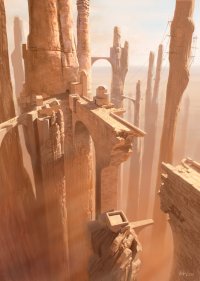 SaarAkaOre (170 KB)
SaarAkaOre (170 KB)
8. When it was released, Outcast has often been compared to a real Hollywood production. Today where the adaptations of video games into movies bloom, would you be interested in the experience?
FS : Of course! But I think that it is necessary to reach a considerable commercial success first (several millions) with the game to attract investors from the cinema industry. Besides, a universe like the one of Outcast would be very expensive as a film adaptation.
9. Talking about cinema, Outcast had a brilliant music composition. How did the conception of the original soundtrack happen? In which way did you intervene? Will you call Lennie Moore and the Moscow Symphonic Orchestra again for Outcast 2?
FS : I posted ads on newsgroups of composers concerning the production of a symphonic music for Outcast. After receiving tens of answers, we kept the one of Lennie because he had the experience of collaborations with the MSO. He first came here to debate musics to compose, then when he started to write, he sent me MP3 working files made with a synthesizer and that until the validation of all the tracks. After we went one week in Moscow to record with 81 musicians and 24 choristers. William Stromberg directed the orchestra (big Hollywood character of the restoration of old movies tracks), and I must say that the producers Helena and Martina Levine had made an excellent preparation work. Veronique, an artist from Belgium, went with us to produce the making of. It was indeed a unique experience and I will always keep an excellent memory of it, and because the result was excellent, we will work with the same people. There will be a new musical component however, and even some surprises since we have to adapt to the new OC2 scenario, but I donít wish to say more...
orchestra_at_mosfilm_studios_moscow (53 ko)
10. If we compare Outcast to other successful games of the same style, we can notice that its universe is distinctly less violent and dark. From where does this humanist side come at a time where strong concepts in extreme sensations generally get the affection of the public?
CF : Strong concepts and sensations are not something uniquely related with gloomy and violent universes. The player is definitely a complex individual, and therefore there are many ways to reach and shake him on the emotional level. So, I like to think of the Outcast universe as an attempt to reach and move the player in a different way, perhaps not as mainstream as other ways, but definitely richer, and perhaps deeper than a few of them.
11. In Outcast, the death of Marion Wolfe remains probably one of the most tragic moment of the scenario. How does one decide to kill a main character, especially feminine, in a story designed to appeal to a "wide audience"? Did the publisher object to the incorporation of this event?
FS : Itís Douglas Freese, our scenario writer and game designer at that time, who have had this very good idea. It strengthens the human aspect and its fragility, especially when we are used that, in the games universe, the good guys never die. It was our will too to give the scenario a more mature and less corny tone. Curiously, our marketing people didnít want that we kill Marion but when they saw the result at the end, they had to acknowledge that it was a very good idea.
12. The multiplayer (especially with the MMORPG) seems to be the future of the video game. What do you think of it? Actually what can be the place of a solo game in a market which goes more international everyday?
FS :Thatís a way we will have to explore for sure but we are not ready technology wise. For the moment we concentrate on the solo experience, one is not able to do everything at the same time.
13. When we see MMORPG games like Starwars Galaxies, we can imagine that the universe of Outcast could be also a good basis to this style of game. Would you be seduced by this idea or do you think that Outcast is not suitable to such a project?
CF : You touch an important point here. The potential engendered by the Outcast universe allowed us for the moment to enhance the gameplay in Outcast 2 while still doing an action/adventure game. However, the Outcast universe definitely allows for the exploration of other game genres. Will it be done? My opinion as a game designer is that it can be done, with very interesting results. However, the potential of an idea is not the only thing that determines its feasibility, especially in this industry...
14. The sequel to Outcast is one of the most awaiting game at this time. How does one manage such a waiting, such a pressure?
FS : So far as we are concerned, the pressure comes more from the deadlines.
YR : As you could see it, we decided until now to isolate ourselves a bit to concentrate on the development. We know that as soon as we will start to communicate on the product, it will be difficult to manage the pressure coming from the outside as well as the inside one.
|
Lennie_Franck_and Bill_in_moscow (71 ko)
|
15. What is the most difficult: working on a new original project or on a much awaited sequel?
FS : Retrospectively, I think itís easier to start a project from scratch. We wasted a lot of time in the beginning notably because of the excess of bias of some people around the project, in particular at the publisher. Itís a paradox but when a project is interesting, everybody wants it. It happens then that you go nowhere sometimes. When your project is less exciting, one leave you in peace... You can advance quicker.
YR : On the technical level, I think that we would have developed the same technological bases either for the sequel of Outcast or a new project since, however that may be, we would have made a project based on characters in complex environments.
16. Did you plan the sequel from the start or is it merely a response to the huge welcome of the public?
FS : Obviously, we left open doors. But the publicís enthusiasm is an essential factor of course.
17. Usually, when a video game character as charismatic as Cutter Slade receives such a response from the public, we can witness a big marketing operation. How could Cutter escape that?
FS : For that, you will have to ask Infogrames.
18. For Outcast 2, do you plan an even bigger personalization of the hero? By the way, will the French voice of Cutter still be insured by the one who doubles Bruce Willis?
FS : Technology now allows to go further into the personalization of the characters (more detailed motion capture, more realistic facial animationÖ), but for the voice it depends on the actorís availability. We will do what we can to keep the one who doubles Bruce Willis.
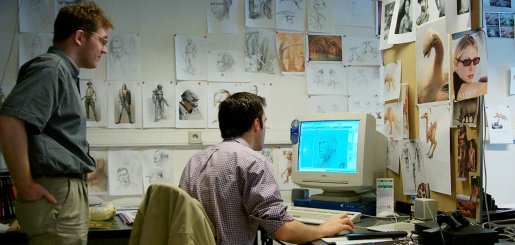
Ivan_working_on_characters (217 ko)
19. Will the player have the possibility to play others characters than Cutter Slade in Outcast 2?
FS : No.
20. In Outcast 1, the characters' animation was done with "motion capture". Is it still the case in Outcast 2? Which limits are involved with this technology (I think especially about the animals' animation)?
FS : We have recently built a new studio of motion capture which allows us to capture all the body and the fingers. We have also developed tools which allows us to touch up the captured animations comfortably and to mix directly motion capture and keyframing in Maya. Besides, we acquired a FaceWorks system that allows thanks to a kind of mixing table to control the facial expression and a VoiceWorks system that automates the lipsync from a wav file corresponding to the phrase spoken by the actor. What is not humanoid is animated by hand in keyframing.
21. The Artificial Intelligence of the NPCs in Outcast 1 was already advanced. How and to what level do you want to improve this one?
YR : We kept the principles of GAIA, the AI engine used in Outcast 1, while simplifying the implementation and the use of it. For Outcast 2, we wish to insist on the means to make a behavior credible rather than to do a simulation at all costs.
22. On the first artworks of Outcast 2, one can read the subtitle ĎThe Lost Paradiseí. Is this the official name or merely the projectís name? Without revealing too much the scenario of course, what does this title involve?
FS : Itís still a temporary name but the game could have this title at the end. We wanted that Outcast 2 becomes a subtitle not to frighten people who wish to buy the game without having played the first episode. About the scenario, it was also a priority from the start, especially as there is a console version, not to have any pre-requisite to understand the story and the universe of Outcast 2. But in the other hand some subtleties and references are there for the fans. About the origin of title "Lost Paradis", it comes from this planet Adelpha, so harmonious and beautiful before occurs the event of... Outcast 2.
23. The few information known on the environment present in this sequel, refer to a new civilisation (different from the Talans), to the apparition of feminine characters and to a more abundant fauna? Can you tell us more about those points?
FS : Some of these information are true. We were pleasantly surprised to see some fans succeeding to interpret correctly the information and to create a scenario for the Lost Paradise very close to the one that we have developed. What we can say now is that the game happens in the South hemisphere of Adelpha, in places that Cutter has never visited.
CF : Just to add something to that, what youíre going to see in Outcast 2 is not Ďmore of the sameí. Players are going to have the chance to know more about the Talan civilization, discovering things that were not even hinted in Outcast, along with things that will have a clear connection with the previous chapter of the saga. All this in an atmosphere that is radically different from the one that Cutter found when he reached Adelpha for the first time.
24. One of the most original feature of Outcast (one that some saw as a drawback) was the use of a greedy voxel engine. At that time, what had pushed you to use this technology ?
FS : When we began, there was no 3D acceleration and software polygons were too slow to create outside environment. When 3D acceleration arrived, it was too late to change the technology. It was because the development took 4 years that we found ourselves sit between two generations of hardware.
|
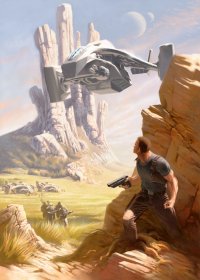
Ganzaar_Falcon_Attack (290 KB) |
25. Outcast 2 has now a new polygon-based engine, developed by yourselves and called "Himalaya". What improvements do you have with it compared to the voxel. Will it be able to render the same, so particular visual aspect of the first episode, i.e. this softness in the curves and a very bright color palette?
FS : It's very different. We donít have any topology limits anymore but the scenes are very complex to program. For the lighting of a scene (outside and inside), we use a software of radiosity called Lightscape. This one can take several days (on a 1.3Ghz AMD with 768MB DDR RAM) to calculate the solution for the lighting of a map. But the result is very promising. In any case, the look, different from the voxels' one, is very different from the competing polygon engines.
26. When one does finalize a motor like this one, are the benefits coming from the sales of the games which use it enough to make profits or do you absolutely have to find people to buy it after?
YR : The profits coming by the sales should be enough to return value for the technology but it is clear that to enjoy totally this heavy investment, you have to develop several games based on this technology (while improving it constantly). Thatís what we intend to do. We are not structured yet to sell our technology to others studios. This would involve additional resources for the maintenance and the documentation but itís a scenario that we also consider.
27. When the development of a project spreads on several years, how can one stay coherent in front of a such fast developing technological progress?
YR : I think that you have to set for yourself ambitious goals and to see far from the start when you define your technological needs. Itís our role to Franck and to me. Itís there that the rest of the team think we are crazy before rallying then enlarging this vision.
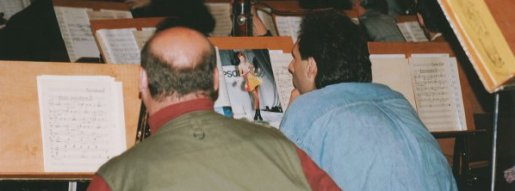
Reading_magazine_between_takes_moscow (37 ko)
28. Outcast 2 is planed on PC, of course, but on PS2 too. Is it a better way to make profit with the game (PC game market is not the biggest in terms of sales) or is it a decision to offer the experience of Outcast to a larger audience?
FS : Both! Itís clear today that Outcast 2 will not make profits on PC only. And if you want to make from Outcast 2 an omnipresent franchise, you have to reach the most people you can then work on a maximum of platforms. Itís also very pleasant to develop on console.
29. Talking about that, if you look at the relative benefits coming from a PC game, could the emergence of more and more sophisticated consoles with more and more PC-like features, challenge the very existence of PC games, according to you?
FS : Absolutely not. The PC is and will stay a platform on its own but for a more aware public. The console will be more and more popular. But the actual situation is exactly the one of the release of the PS1, which at that time competed with the PC graphics wise. Then, time after time, PCs evolved and outclassed easily the PS performances. That will be the same soon. What attracts us in this console is the hardware stability which allows us to concentrate on the game itself.
30. What is your opinion about the growth of the current market with the PS2 and the next release of the X-Box and the NGC? On which of these new consoles would you like to develop your future projects? For what reasons?
FS : Itís very likely that O2 will be released one day on the X-Box, knowing the relative simplicity of the conversion from the PC to the X-Box. But we actually concentrate on the PS2 and PC versions. We think that the PS2 will represent the majority of the console market when O2 will be released, so for us itís the main console. We are very enthusiastic about the potential of the PS2 and the forecastings of sales are really encouraging.
31. The release of Jedi Knight 2 (which has the subtitle: Jedi Outcast) is planned at the same time as Outcast 2. Is this kind of competition included in the choice of the release date?
FS : It's up to the distributor to manage this kind of problem.
32. While developing, do you keep an eye on the new games released? Do you adapt regularly your project to remain closer to the market or do you stay with the objectives set at the start?
FS : We keep an eye on the new games and it happens that we have to adapt but generally we try to keep our own objectives.
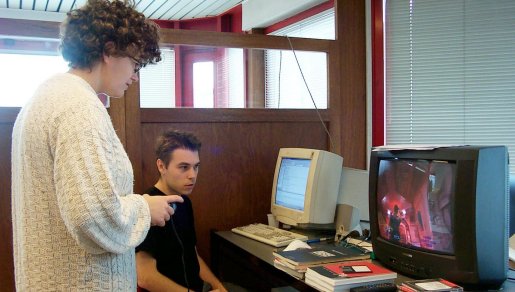
Vero_testing_indoor_scene_with_Alain_in_background (249 ko)
33. About the communication on a video game, how do you manage to use correctly the specialized press? Is it not the most unpredictable part of your job?
FS : The most difficult is the synchronization with the editor. According to the contracts, you never know who you can give any particular information. Itís sometimes a bit frustrating.
34. Do you think that this specialized press always does its information job? What are the main differences between an American and a French interview for example?
FS : A priori! "Hey man, another French game, pfff". "A Belgian game, man..." "Uh !? Belgium, whereís that?"
CF : Actually, you get a bit of everything, not only negative things. There were indeed specialized US magazines that praised both Appeal and Outcast after its release (as is the case of Computer Gaming World). And to them Belgian game development was a very pleasant discovery.
35. Your goal with Outcast was to offer the player a unique experience based on emotion. To your opinion and to conclude, how can an emotion rise from a video game and how will the choices you make on this sequel (a new engine for example) allow you to reach this goal again?
FS : The story, the visual and sound environment, the atmosphere, the personality of the NPC are the essential carriers of the emotion in a game like Outcast. The new technologies allow to reduce the barriers of the artificial more and more by offering a more and more convincing realism. But itís by gathering competent and motivated people that you can achieve this objective.
Interview made by Mathias Martin aka Auk in collaboration with www.outcastii.net.
Many thanks to C. Fabricatore, Y. Robert and F. Sauer for their
devotion and patience.
Many thanks to the whole Appeal team and to the one... who took
the pictures!
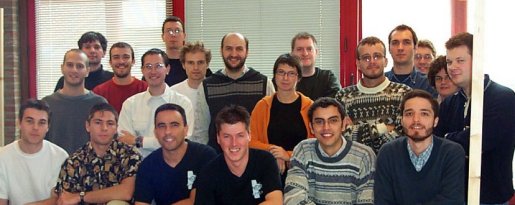
Appeal_Outcast2_Team (153 ko)
|
|
|
|
|
|